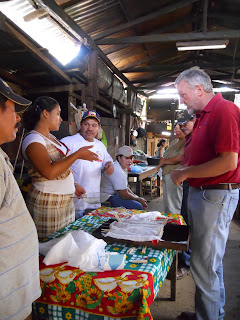Crossing Boundaries for Food’s Sake
Please see below a piece written by Farmer to Farmer Volunteer, Dr. Julie Keown-Bomar. The volunteer traveled as part of a horticulture team to Nicaragua and the article reflects her observations and findings on the local food systems.
Learning about food systems in poor communities is an important step to address nutritional deficiencies, generate family income, develop local economies and promote better health. Three UW-Extension educators recently spent time in Central America asking people about their food situation and the barriers they face securing a healthy diet and a sufficient income for their families.

University of Wisconsin Extension educators, Rob Burke (Door County), Arlen Albrecht (Taylor County) and Julie Keown-Bomar (Eau Claire County) spent time in Nicaragua with the Farmer to Farmer program, a United States Agency for International Development (USAID) program implemented by Partners of the Americas. Burke, Albrecht and Keown-Bomar volunteered to work with non-profits, cooperatives and neighborhood organizations and troubleshoot problems with local food systems. They taught workshops and spent many hours talking with people about their ability to cultivate, process and sell vegetables and fruits. In evaluating the food value chain, they surveyed all stages of the system, from sowing seeds to putting food on the family table and/or in the market place. What they learned was both daunting and inspiring.
Many Nicaraguan adults earn only three to four dollars a day. Family diets are composed primarily of rice, corn and beans and few social support systems exist to help families who lack basic necessities. Neighbors, churches and family help when possible, but most people the educators interviewed expressed serious concerns about access to nutritious food in their communities. Rural families may have excess crops like mangos or tomatoes during peak harvest times, but they have very little access to nutritious food at other times of the year. People mourned the loss of thousands of pounds of vitamin-rich mangos that they could not consume or sell all at once and they had no way to preserve the fruit. Most families have no refrigerators or freezers; canning equipment is not to be found; and people do not have the knowledge and resources to dehydrate the food.
Keown-Bomar solicited donations from local garden supply businesses before her trip. Chippewa Valley Growers and the Potting Shed contributed greatly to this project by donating packets of seeds. Hundreds of gardeners and their families will benefit from their contributions. Tools, seeds and hoses are very expensive for Nicaraguan consumers to purchase on their limited incomes and this financial barrier prevents many people from attempting to grow their own food.
UW-Extension has offered people in Wisconsin research based classes, one-to-one assistance, recipes and tips on growing and putting up food for over 80 years, but Nicaragua presents even the most seasoned gardener or food preserver numerous challenges. Few homes have electricity, transportation is difficult, families have little money to buy seeds if they can find them and food safety is a big concern in communities with unsafe drinking water.
What the educators did find in some of the Nicaraguan communities they visited were enthusiastic learners, hard scrabble gardeners, and foodies— people who simply love food for consumption, study, preparation, and sharing. Porfidio Campos Muñoz from the village of Pio XII, for example, is a gardening enthusiast and an expert in composting. He manages to grow an amazing quantity and variety of food in his mother’s urban garden and on his own plot of land very close to the city dump. He is the Pied Piper for vegetable consumption in his community. He not only cultivates a wide variety of vegetables unfamiliar to the Nicaraguan palate, but he earnestly seeks out new ways to prepare the food he grows and gives away.
When the UW-Extensionists appeared in town ready for a food preparation workshop, Porfidio was waiting with cornucopia of foods unfamiliar to him and a whole lot more ready for the picking in his family garden. Kohlrabi, Swiss chard and kale are chock full of vitamins to supplement the Nicaraguan daily diet, but if people don’t know when to harvest the vegetables and how to prepare them so they are appetizing, they won’t be added to anyone’s diet. In the workshop, twenty five participants tried two vegetable salads with produce from Porfidio’s gardens, learned about the nutritional benefits of eating “a rainbow of vegetables,” discussed how to get children to eat vegetables, and taste-tested kohlrabi to determine ideal harvest size.

Porfidio took this culinary information and experimented on his extended family the next weekend. At his nephew’s graduation party he served fresh vegetable salads, kohlrabi and meat empanadas (very similar to fried pocket pies), and other unexpected dishes. People had never tried these vegetables before but he said they were sold on the new concepts and the food was, “really, really delicious.” In fact, he had to go back to his home garden to pick more produce because his family members wanted to take these new veggies home.
The next week, Julie Keown-Bomar led the group in a hands-on workshop focused on dehydrating different kinds of fruits, vegetables and herbs using an oven. Rob Burke led a discussion focused on the value chain, problems, gaps and barriers. Keown-Bomar said it was challenging to find appropriate technologies that would be available to the participants. She and the workshop participants worked over wood fires to blanch vegetables and she used a wood stove oven for the first time. She said it was “absolutely one of my most treasured experiences in a kitchen, learning and sharing with others.”
The two-way process of cultivating foods and minds at the same time is an experience these Wisconsin educators won’t forget for some time. Food, is indeed, a common ground and a universal experience.

.png)

Comments
Post a Comment